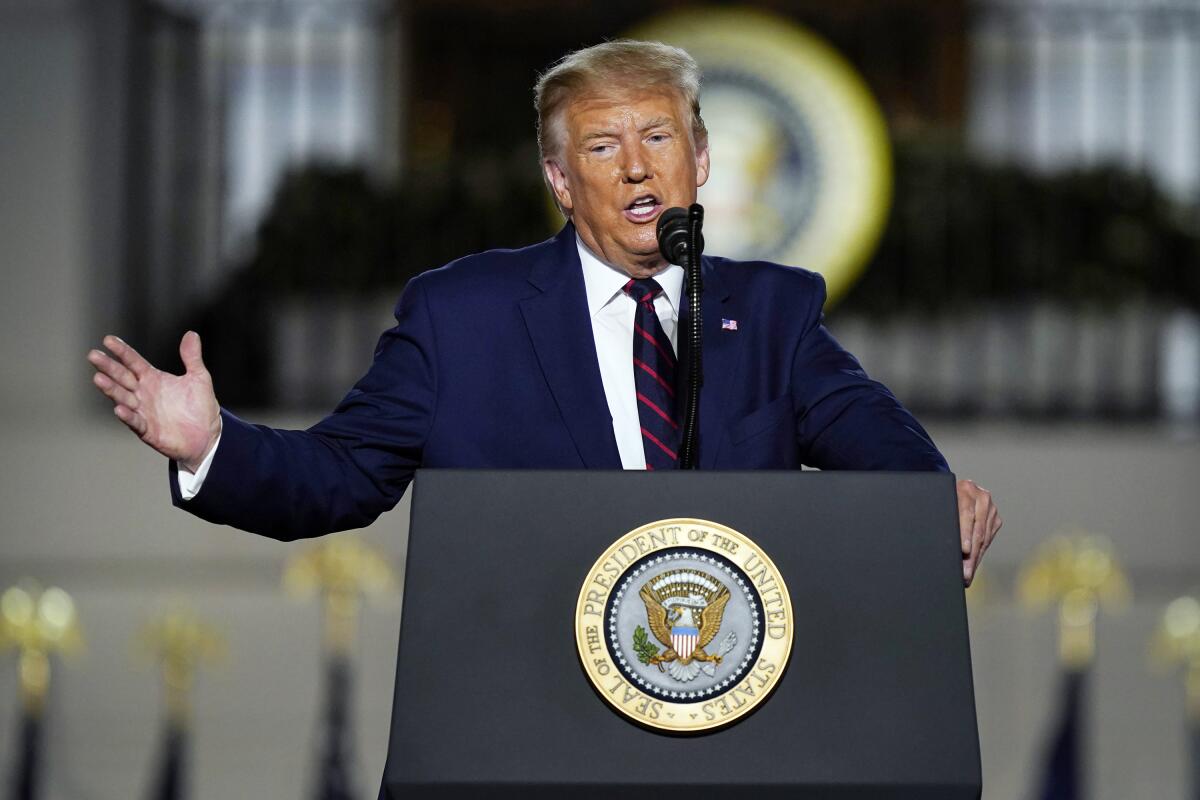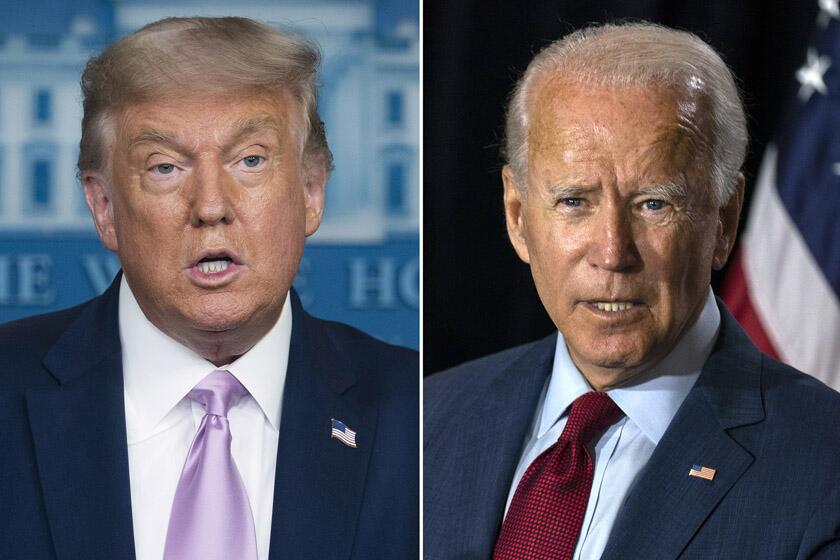News Analysis: Trump stands alone at the RNC, atop a party remade in his image

- Share via
WASHINGTON — Four years ago, then-candidate Donald Trump described the nation’s ills and memorably declared, “I alone can fix it.”
He’s applied that same principle to his reelection campaign.
Trailing significantly behind Joe Biden in the presidential race, Trump put on a convention this week that stood out by how much it focused on him and his family while cutting connections with the Republican Party’s past.
Of the seven living Republican candidates for president and vice president who preceded Trump and Mike Pence, none spoke this week. Nor did any prominent figure from the previous Republican administration. Of the seven Republican senators in the most competitive reelection races, only Sen. Joni Ernst of Iowa spoke. Of the nation’s 26 Republican governors, only two close Trump allies, Govs. Kristi Noem of South Dakota and Kim Reynolds of Iowa, appeared.
Even President Reagan, whose name and legacy dominated the GOP for more than a generation after he left office, got only occasional mention.
The convention did, however, feature Trump’s four adult children, his wife, his personal lawyer and several members of his White House staff.
The lineup was no accident.
“The president made a decision … this convention is about renominating President Trump,” Republican Party Chairwoman Ronna McDaniel said Wednesday when asked in an interview on “PBS NewsHour” about the absence of figures from previous Republican eras.
For longtime Republicans, the effect can be disorienting.
“We got a sneak peek of this” in 2016 when Trump captured the Republican nomination and moved rival figures out of the spotlight at the convention, but “like any good sequel, this is an amped-up version,” said Alex Conant, a Republican strategist and former top aide to Sen. Marco Rubio (R-Fla.). “It’s striking how quickly the party has turned its back on recent history.”
The approach is even more notable when set against last week’s Democratic convention, which included all the party’s living past presidents going back to Jimmy Carter and many of Joe Biden’s primary-season rivals. It also featured several prominent Republicans, capped by the party’s 2008 nominee, the late Sen. John McCain of Arizona, who appeared in a tribute video narrated partially by his wife.
In contrast with the Democratic convention, the Republican gathering has had “a jarring sense of disconnection with the past,” said Julia Azari, a political scientist at Marquette University in Wisconsin. “I can’t really think of a clear analog.”
Through most of U.S. history, “a political party, first and foremost, was supposed to be a lot of people from different backgrounds coming together around shared interests” to agree on a nominee and a set of issues to run on, Azari noted.
In recent elections, she said, that’s become less true, as U.S. politics have become more and more nationalized and focused on the president to the exclusion of other figures. Trump represents the extreme of that trend — a candidate bound to his voters not so much by issues but by a set of shared enemies and a personal loyalty to him as the leader.
“From the moment I left my former life behind — and a good life it was — I have done nothing but fight for you,” Trump declared early in his acceptance speech delivered Thursday night from the South Lawn of the White House, a political use of the executive mansion that shattered long-standing norms and drew sharp criticism.
“Always remember: They are coming after me, because I am fighting for you,” he added nearly an hour later.
Trump has shown over and over during this presidency that he craves the spotlight and has little willingness to share it — and even less to tolerate dissenters within the ranks. But while he’s clearly more comfortable as the sole center of attention, the approach has worsened some serious problems for him in the campaign’s final phase.
To his most fervent critics on the left, Trump’s insistence on dominating the stage and excluding other voices within the party provides further evidence of what they see as authoritarianism. Biden’s warning that “democracy is on the ballot” is a potent rallying cry and motivator for many Democratic voters who might otherwise see the former vice president as a bland, aging product of his party’s establishment.
Trump’s approach also risks alienating voters closer to the center. Conventions have traditionally served to unify a party’s disparate factions, but Trump “feels no need to unite,” Conant said.
“The consequence of that you saw this morning,” he said, when hundreds of former aides to Bush, McCain and Utah Sen. Mitt Romney, the party’s 2012 nominee, publicly endorsed Biden. “You can see him potentially underperforming with voters who typically vote Republican but view themselves as independents.”
Moreover, by putting together a convention that combined family members with a “grab bag of hangers-on and marginal figures,” as Vanderbilt University political science professor John Sides put it, Trump has heightened the degree to which the election will turn on voters’ view not of specific issues but of him, personally.
Democrats have seized on that, as Sen. Kamala Harris, the party’s vice presidential candidate, did in a speech Thursday afternoon.
“The Republican convention is designed for one purpose: to soothe Donald Trump’s ego. To make him feel good,” the California senator said. “But here’s the thing: He’s the president of the United States, and it’s not supposed to be about him.”
A look at where President Trump and Joe Biden stand on key issues in the 2020 election, including healthcare, immigration, police reform and climate.
The Republicans have tried throughout the convention to shift the terms of the debate, focusing not on Trump’s performance in office as much as on their depiction of Biden as a puppet of the Democratic Party’s left wing.
They want to frame the choice facing voters as one that pits traditional values against radical social change: “Whether we will leave our children and our grandchildren a country grounded in our highest ideals of freedom, free markets and the unalienable right to life and liberty — or whether we will leave to our children and grandchildren a country that is fundamentally transformed into something else,” as Pence said in his speech Wednesday night.
Trump in his speech also sought to frame the election that way.
“Biden’s record is a shameful roll call of the most catastrophic betrayals and blunders in our lifetime,” he said.
“Their agenda is the most extreme set of proposals ever put forward by a major party nominee,” he added, denouncing Biden as “a Trojan horse for socialism.”
But political messages work most successfully when the text and staging combine to convey the same idea. In Trump’s case, they consistently have not.
As much as the words this week have declared that voters should focus on Biden, every other element of the convention has virtually screamed that it’s all about Trump.
Entering the final 10 weeks of the campaign, that’s a risky position, Sides said.
“The base mobilization, the red meat, the culture war — that’s what he’s been doing for years,” he said. So far, “it hasn’t worked.”
More to Read
Get the L.A. Times Politics newsletter
Deeply reported insights into legislation, politics and policy from Sacramento, Washington and beyond. In your inbox twice per week.
You may occasionally receive promotional content from the Los Angeles Times.












